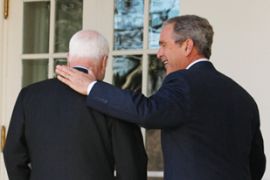McCain wins Bush endorsement
US president backs Republican candidate as Democrat race rumbles on.

Published On 6 Mar 2008
Bush defeated McCain in the battle for the 2000 presidential nomination following a bitter campaign and the two have clashed on a number of issues, including tax cuts.
| In focus |
|
▪ Profile: John McCain |
“I appreciate his endorsement. I appreciate his service to our country,” said McCain, an Arizona senator.
“I hope that the president will find time from his busy schedule to be out on the campaign trail with me.”
Bush’s approval ratings among voters are extremely low, dragged down by the unpopular Iraq war and fears about the faltering US economy.
However, analysts say he could help convince conservatives within the Republican party who remain sceptical about McCain’s candidacy.
“They’re not going to be voting for me,” Bush said. “I’ve had my time in the Oval Office.”
Election victory
On Tuesday, McCain reached the 1191 delegates required to win the Republican nomination after primary wins in Texas, Ohio, Rhode Island and Vermont.
| Your Views |
Mike Huckabee, the former governor of Arkansas and the only candidate with a chance of defeating McCain, subsequently dropped out of the race.
Al Jazeera’s Rob Reynolds said Bush’s endorsement would help McCain raise funds and his victory gave him a head start on the Democratic nominee.
“He will have plenty of time to consolidate while Democrats are snapping at each other.”
Clinton battles back
In the Democratic race, both Hillary Clinton and Barack Obama claimed victories as their bruising battle for their party’s nomination seemed set to drag on throughout the summer.
| Delegate breakdown | ||||||||||||
Source: Reuters |
Clinton finally halted the momentum Obama had built up of 12 straight victories by winning the key battleground states of Texas and Ohio.
She also clinched the state of Rhode Island, while Obama won Vermont.
Intriguingly, the New York senator did not rule out the possibility of running a joint campaign with Obama.
“But of course we have to decide who is on the top of the ticket,” she told CBS television.
“I think the people of Ohio very clearly said that it should be me.”
Superdelegates issue
Obama, however, said he was still in control of the Democratic race and pointed to his lead among delegates pledged to nominate him at the party’s convention in August.
“We’ve won twice as many states, we’ve won a greater share of the popular vote and, what I think [is] most important, we’ve won far more independents and Republicans than Senator Clinton has,” he told CBS.
“And that’s, I think, what we’re going to need to do to beat John McCain in the fall.”
The Democratic stalemate puts the focus back on more than 350 uncommitted “superdelegates” – elected party officials and insiders – who could heavily influence the race if they back either Obama or Clinton.
The next election primary will be held in the southern state of Mississippi on March 11, while the Democrats are due to hold caucuses on March 8.
The state of Pennsylvania will also hold a primary on April 22.
Meanwhile the Canadian government says it is planning an investigation into the reporting leaking of a memo which implied Obama’s campaign had said that his stance towards Nafta was not as protectionist as he had indicated.
Source: Al Jazeera, News Agencies
